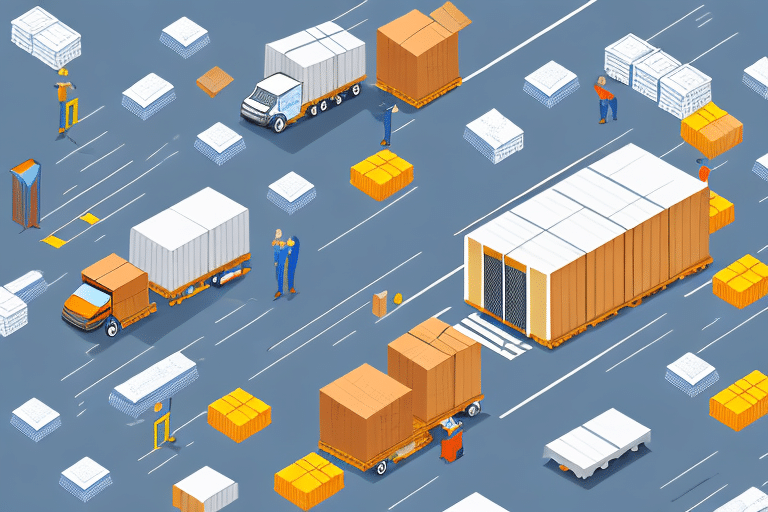What Is a Logistics Service Provider for Ecommerce Businesses?
Running an ecommerce business involves managing a complex supply chain that includes storing inventory, packing orders, and shipping products efficiently to ensure customer satisfaction. This is where a logistics service provider (LSP) comes into play. An LSP specializes in managing and optimizing your supply chain operations, ensuring that your products reach customers in a timely and cost-effective manner. By partnering with a reliable LSP, ecommerce businesses can focus on core activities like marketing and product development while leaving the logistics to the experts.
The Importance of Logistics Service Providers in Ecommerce
The success of an ecommerce business is heavily reliant on its ability to deliver products efficiently to customers. Logistics service providers contribute significantly by streamlining supply chain operations, which can lead to:
- Faster Delivery Times: Efficient logistics ensure that products reach customers quickly, enhancing their shopping experience.
- Cost Reduction: Optimizing shipping routes and inventory management can lead to significant cost savings.
- Enhanced Customer Satisfaction: Reliable delivery builds trust and encourages repeat business.
According to a 2023 Statista report, logistics costs account for approximately 12-15% of total ecommerce revenue, highlighting the critical role LSPs play in profitability.
How Logistics Service Providers Help Ecommerce Businesses Succeed
Inventory Management
Effective inventory management is crucial to prevent stockouts and overstocking. LSPs utilize advanced systems to monitor stock levels in real-time, ensuring that the right products are available when needed.
Optimized Shipping and Delivery
LSPs analyze and select the most efficient carriers, routes, and transportation modes to minimize costs and delivery times. This optimization often results in a significant reduction in shipping expenses, sometimes up to 20%, as reported by Inbound Logistics.
Data-Driven Insights
Logistics service providers offer valuable analytics that help ecommerce businesses make informed decisions about product stocking, shipping options, and market expansion strategies.
Enhanced Customer Service
With real-time tracking and accurate delivery estimates, LSPs improve the overall customer experience. This transparency reduces customer inquiries and complaints, fostering loyalty and repeat business.
Value-Added Services
Many LSPs offer additional services such as packaging, labeling, and returns management. Outsourcing these tasks allows ecommerce businesses to focus on their strengths while benefiting from specialized expertise.
Types of Logistics Service Providers
There are various types of logistics service providers, each catering to different aspects of the supply chain:
- Fulfillment Centers: Handle receiving, storing, packing, and shipping products on behalf of ecommerce businesses.
- Couriers and Express Delivery Providers: Specialize in the swift delivery of small packages and documents.
- Freight Forwarders: Manage the transportation of large shipments via land, sea, or air.
- Customs Brokers: Navigate the complexities of customs clearance for international shipments.
- Third-Party Logistics Providers (3PLs): Offer a comprehensive range of services including transportation, warehousing, and distribution.
- Cold Chain Logistics Providers: Ensure the safe transportation and storage of temperature-sensitive products like food and pharmaceuticals.
Selecting the appropriate type of LSP depends on your specific business needs. For instance, ecommerce businesses focusing on international markets might benefit more from freight forwarders and customs brokers.
Choosing the Right Logistics Service Provider
Selecting the right LSP is crucial for the seamless operation of your ecommerce business. Consider the following factors:
- Experience and Expertise: Ensure the provider has a proven track record with businesses similar to yours.
- Technology and Infrastructure: Advanced systems for inventory management and real-time tracking are essential for efficiency.
- Costs and Fees: Compare pricing structures to ensure competitive rates without compromising service quality.
- Customer Service: Responsive and reliable customer support can significantly impact your business operations.
- Scalability: Choose an LSP that can grow with your business, accommodating increased demand and expansion into new markets.
According to a Forbes article, partnering with an LSP that aligns with your business goals can lead to enhanced efficiency and profitability.
Evaluating the Performance of Your Logistics Service Provider
Regularly assessing the performance of your LSP ensures they meet your business standards. Key metrics to monitor include:
- Delivery Times: Measure the average time taken from order placement to delivery.
- Order Accuracy: Track the frequency of incorrect or missing items in shipments.
- Costs and Fees: Analyze shipping costs against industry benchmarks to ensure competitive pricing.
- Customer Satisfaction: Collect feedback to gauge customer satisfaction with delivery services.
Utilizing performance dashboards and regular review meetings can help maintain accountability and identify areas for improvement.
Key Features to Look for in a Logistics Service Provider
When selecting an LSP, consider these essential features:
- Real-Time Tracking and Monitoring: Provides visibility into shipment status, enhancing transparency and customer trust.
- Customization and Flexibility: Ability to tailor services to meet your unique business needs.
- Data Analytics and Insights: Access to detailed analytics helps in optimizing supply chain operations.
- Scalability: Ensures the provider can support your business growth and handle increased logistics demands.
- Integration Capabilities: Seamless integration with your ecommerce platform and other business systems.
These features not only streamline operations but also provide a competitive edge in the dynamic ecommerce landscape.
Top Trends in the Logistics Service Provider Industry for Ecommerce
The logistics industry is rapidly evolving to meet the demands of modern ecommerce businesses. Key trends include:
- Automation and Robotics: Increased use of automated systems and robotics in warehouses enhances efficiency and reduces errors.
- Blockchain Technology: Enhances transparency and traceability in the supply chain, reducing fraud and ensuring data integrity.
- Artificial Intelligence (AI): AI-driven analytics optimize supply chain operations and improve decision-making processes.
- Sustainability: Growing emphasis on eco-friendly practices, such as green transportation and sustainable packaging, to reduce carbon footprints.
- Omnichannel Logistics: Integration of multiple sales channels ensures a seamless customer experience across all platforms.
Staying abreast of these trends can help ecommerce businesses adapt and thrive in a competitive market.
Common Challenges Faced by Ecommerce Businesses with Logistics Service Providers
While partnering with an LSP offers numerous benefits, it also comes with potential challenges:
- Delivery Delays: Unexpected delays can negatively impact customer satisfaction and brand reputation.
- Inventory Management Issues: Ineffective inventory management can lead to stockouts or overstocking, disrupting business operations.
- Rising Costs and Fees: Fluctuating logistics costs can affect profitability if not managed properly.
- Communication Breakdowns: Poor communication between the business and LSP can result in misunderstandings and operational inefficiencies.
- Integration Challenges: Difficulties in integrating LSP systems with existing business platforms can hinder seamless operations.
Addressing these challenges proactively through clear communication and regular performance reviews is essential for maintaining a successful partnership.
Building a Successful Partnership with Your Logistics Service Provider
Establishing a strong relationship with your LSP is vital for long-term success. Here are some strategies to foster a productive partnership:
- Establish Clear Expectations: Define service levels, delivery times, and cost structures to ensure mutual understanding.
- Regular Communication: Maintain open lines of communication through regular meetings and updates.
- Provide Constructive Feedback: Share insights and feedback to help the LSP improve their services.
- Collaborate on Solutions: Work together to address challenges and implement improvements.
- Celebrate Milestones: Acknowledge and celebrate successful projects and achievements to strengthen the partnership.
Building trust and fostering collaboration can lead to enhanced efficiency and a more resilient supply chain.
The Future of Logistics and Ecommerce Business
The intersection of logistics and ecommerce is set to become even more dynamic and technology-driven. Future developments include:
- Greater Use of Data Analytics and AI: Advanced analytics and AI will play a crucial role in predicting trends, optimizing routes, and personalizing customer experiences.
- Increased Use of Autonomous Vehicles: Self-driving trucks and drones are expected to revolutionize the delivery process, reducing costs and delivery times.
- Widespread Adoption of Blockchain Technology: Enhances supply chain transparency, ensuring authenticity and reducing the risk of fraud.
- Enhanced Sustainability Efforts: Continued focus on reducing environmental impact through sustainable practices and green technologies.
- Integration of Internet of Things (IoT): IoT devices will provide real-time monitoring and management of logistics operations, improving efficiency and responsiveness.
As these technologies mature, ecommerce businesses that leverage these advancements will gain a competitive advantage in the market.
In summary, partnering with a logistics service provider is essential for ecommerce businesses aiming to streamline their supply chain, reduce costs, and enhance customer satisfaction. By carefully selecting the right LSP and fostering a strong partnership, businesses can navigate the complexities of logistics and position themselves for sustained growth and success in the evolving ecommerce landscape.






















